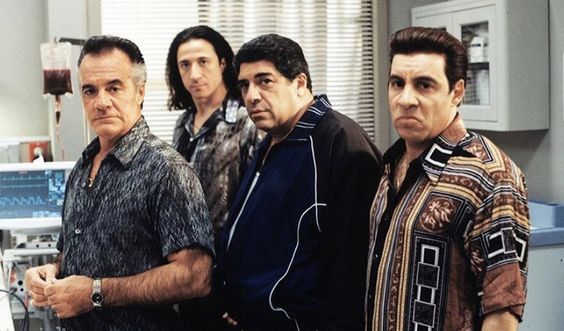
Introduction: The Sopranos Paradox and Gilmore Girls Connection
When you think of iconic TV shows, Gilmore Girls and The Sopranos might not immediately spring to mind as being related in any way. One is a beloved dramedy about a fast-talking mother-daughter duo in a small town, while the other dives deep into the gritty world of New Jersey mobsters. However, there’s a strange paradox that connects these two seemingly disparate shows. The Sopranos paradox isn’t limited to just one show—it appears in many television shows, where characters or plot twists seem oddly familiar or play off certain themes in unexpected ways.
So, if you’ve always thought Gilmore Girls was the only show to contain this paradox, you’re in for a surprise. Other shows, though different in tone and genre, also carry this hidden, bizarre paradox. Let’s dive into how TV shows like Gilmore Girls and The Sopranos share an almost eerie connection, as well as uncovering other shows that follow the same pattern.

What Exactly is the Sopranos Paradox?
Before we dive into comparisons, let’s break down what we mean by the Sopranos paradox. In essence, it refers to a particular narrative or thematic twist that can be seen in multiple shows. Often, these paradoxes appear in the form of characters, plot lines, or situations that cross over into seemingly different genres or settings, creating unexpected connections.
In The Sopranos, for example, we see how ordinary, seemingly harmless situations intertwine with deep moral dilemmas, reflecting the contrast between family life and crime. It’s a duality that makes the show both intense and oddly relatable, despite its dark subject matter.
How Does Gilmore Girls Fit Into the Paradox?
At first glance, the world of Gilmore Girls couldn’t be further from that of The Sopranos. But the paradox lies in the complex family dynamics both shows portray. The Gilmore women, Lorelai and Rory, constantly juggle the weight of societal expectations with their desire for freedom. This internal battle mirrors the moral quandaries seen in The Sopranos, where characters like Tony Soprano attempt to balance their criminal life with their responsibilities as fathers, sons, and husbands.
1. Duality of Character: Lorelai and Tony
Lorelai Gilmore and Tony Soprano might seem like they have little in common, but both are characters who wrestle with dual identities. Lorelai, like Tony, is trying to maintain a balance between two conflicting worlds: one that expects her to follow a specific path (her family’s traditional expectations) and one that pushes her toward personal freedom (as a single mother and business owner).
The paradox emerges in how both characters deal with family loyalty and personal ambition. Lorelai’s relationship with her mother, Emily, often puts her in a position where she feels forced to uphold family tradition, while Tony’s criminal activities often force him into morally questionable situations.
2. Small Towns and Big Secrets: An Unexpected Parallel
Another odd parallel between Gilmore Girls and The Sopranos lies in the concept of small towns with big secrets. Stars Hollow, the picturesque New England town, seems like a cozy, idyllic place. However, beneath its charming exterior, it’s filled with quirky, often hidden, complexities. The residents have their own secrets, often more dramatic than they let on, making Stars Hollow feel like a place that could be hiding something sinister.
In The Sopranos, the town of North Caldwell might not be quaint or charming, but it similarly hides deep, dark secrets beneath its ordinary surface. This setting paradox highlights how, even in seemingly innocent locations, there can be undercurrents of conflict, ambition, and betrayal.
Other TV Shows With a Sopranos Paradox
Believe it or not, Gilmore Girls and The Sopranos are not the only TV shows to feature a Sopranos paradox. Several other series have explored similar themes of duality, family dynamics, and hidden secrets.
3. Breaking Bad: The Duality of Walter White
Like The Sopranos, Breaking Bad centers around a complex character—Walter White—who must balance his everyday life as a teacher and family man with his criminal alter-ego, Heisenberg. Much like Tony Soprano, Walter struggles with maintaining his morality while being immersed in a world of crime. The paradox in Breaking Bad lies in Walter’s constant internal battle, much like Tony’s in The Sopranos.
4. Mad Men: The Hidden Lives of Ad Men
In Mad Men, we also see a paradox. Don Draper, much like Tony Soprano, leads a double life. On the surface, Don is a successful and suave ad executive, but beneath that exterior lies a man full of deep secrets, emotional turmoil, and moral ambiguity. Mad Men reveals the dark side of the American Dream, showing how individuals can seem outwardly perfect while concealing deep flaws.
5. The Crown: Royal Secrets and Family Drama
Though The Crown deals with real-life historical figures, the Sopranos paradox can still be seen in its portrayal of the British royal family. Queen Elizabeth, like Tony, struggles with the weight of family duty and personal desires. Her responsibility to the monarchy forces her to make decisions that hurt her family, reflecting the paradox between personal ambition and familial loyalty, a key theme in both Gilmore Girls and The Sopranos.
Why These Paradoxes Matter in TV Writing
The Sopranos paradox is so compelling because it highlights an important aspect of storytelling—the tension between personal desire and family loyalty. These paradoxes allow viewers to connect with characters on a deeper level, as they too face similar struggles between what society expects of them and what they truly want.
How Paradoxes Create Complex Characters
One of the key reasons The Sopranos and shows like Gilmore Girls resonate with audiences is the complexity of their characters. They aren’t just one-dimensional; they’re multidimensional, filled with contradictions. Viewers can relate to characters like Tony, Lorelai, or Walter because we all experience inner conflict. The paradoxes on these shows serve as a mirror for the audience, allowing us to reflect on our own lives and decisions.
The Appeal of the Sopranos Paradox in Pop Culture
The appeal of these paradoxes in pop culture goes beyond just the shows themselves. They represent a broader theme that resonates with anyone who feels torn between different aspects of their identity. Whether it’s the balancing act between work and family, good and evil, or tradition and change, these paradoxes highlight the struggle for personal fulfillment while adhering to societal expectations.
Conclusion: The Ever-Present Paradox of Family, Secrets, and Identity
In the end, the Sopranos paradox isn’t unique to one show—it’s a recurring theme in many of the most popular TV series. Whether it’s the dramatic tension of Gilmore Girls, the moral ambiguity of The Sopranos, or the dual lives of characters in shows like Breaking Bad and Mad Men, these paradoxes reveal the complexity of human nature. We are all, in some way, balancing multiple identities and constantly navigating the space between our desires and responsibilities.
As TV continues to evolve, expect to see more shows exploring these dualities. After all, they reflect the real-life contradictions we all face.
FAQs
1. What is the Sopranos paradox?
The Sopranos paradox refers to the complex, dual nature of characters who live two conflicting lives—one of personal ambition and one of family loyalty. It’s a theme that appears in several TV shows, including Gilmore Girls.
2. How do Gilmore Girls and The Sopranos share a connection?
Both shows explore family dynamics and personal identity. Lorelai in Gilmore Girls and Tony in The Sopranos deal with balancing conflicting worlds—family expectations vs. personal desires.
3. What other TV shows feature the Sopranos paradox?
Shows like Breaking Bad, Mad Men, and The Crown also explore similar themes of duality, personal ambition, and family duty.
4. Why are these paradoxes so appealing in storytelling?
These paradoxes make characters more relatable and complex. They reflect the internal struggles many people face between following societal norms and pursuing their own desires.
5. Will more TV shows explore these paradoxes in the future?
Given their popularity and relatability, it’s likely that future TV shows will continue to explore the Sopranos paradox and similar themes of dual identity and moral conflict.